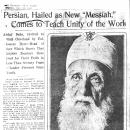Main menu
- ‘Abdu’l-Bahá’s Journey
- World Peace
- Stopping Racism in America
- Empowerment of Women
- More Principles...
- Prayer for America
Persian Hailed as New "Messiah," Comes to Teach Unity of the World
‘Abdu’l-Bahá, Invited to Visit Cleveland by Followers Here — Head of Sect Which Boasts That 50,000 Members Have Died for Their Faith in Less Than Seventy Years — Leader Prisoner Since Youth.
“What hath God wrought?”
These words of Samuel F. Morse, sent tingling over the world’s first telegraph line between Washington and Baltimore, heralded the birth of ‘Abdu’l-Bahá Abbas.
Such is the belief of the 2,000,000 followers of the Persian philosopher and teacher of a new religious cult, who is now on a visit to the United States, and who is expected to include Cleveland in his itinerary.
‘Abdu’l-Bahá, son of Bahá’u’lláh, whose coming was foretold by Báb, a religious revolutionist, who followers claim was a John the Baptist, for their belief was born on the same day that the fist telegraph message was sent. Bahá’ís place a new meaning upon the words of Morse, the inventor.
Although the new cult is less than sixty years old, 50,000 of its members have died as martyrs to their faith in Persia and Turkey. ‘Abdu’l-Bahá has a considerable following in Cleveland. Meetings are held each Wednesday evening at the home of Dr. Charles M. Swingle, 8203 Wade Park Avenue. Members of the Bahá’í belief here have requested the prophet to visit Cleveland.
Teaches Unity of World.
‘Abdu’l-Bahá teaches that the solar system is like a blade of grass. That it serves its purpose, withers and decays.
It teaches that there are many suns and that s new system is formed by the collision or grazing of two dead suns.
‘Abdu’l-Bahá is looked upon as the one of whom Daniel spoke of as “The ancient of days,” who was to appear at the end or the age to set up the kingdom of God on earth. Through ‘Abdu’l-Bahá all religions will be united and brought into harmony, followers claim.
‘Abdu’l-Bahá is an old man, with a worn and beautiful face, who wears a long, brown gown and a white turban, and speaks the strange-sounding guttural language of Persia.
For forty years he has been in prison and his father, the former head of the Bahá’ís, died in prison. Their offense was indeed great, for they taught a doctrine against which no autocratic power could stand. They preached the love of God and the brotherhood of man, and for this the Persian government exiled and the Turkish government imprisoned them.
Prison Doors Opened.
Four years ago, in July, 1908, the young Turks came into the control of the government and a constitution was given to the country. Then the prison doors opened for ‘Abdu’l-Bahá and he found himself free. He had gone into the prison a boy: he left it an old man.
He had not complained and, indeed, for some years it had been made easy for him by the affection of his jailers and the gradual perception, by the government, of the fact that a man who teaches, the common brotherhood of all humanity may not be personally violent, but none the less he rejoiced in his freedom. With the passing of the years his followers had grown rapidly and he had a wish to see them, especially those who lived in foreign countries.
A though he was old and had not for more than forty years gone beyond the city of Acre, in Syria, he was attracted by the thought of seeing the big world. The Bahá’í believe above all things in education and in broadening the mind by contact with all nations and races, so it was eminently consistent for ‘Abdu’l-Bahá to go first to London and then to come to America to see the many disciples in this country.
The Bahá’í movement is not seventy years old and has grown amazingly. It has suffered persecutions which may be equaled but can hardly be surpassed by the martyrdoms of the early Christians.
A young Persian, who called himself the Báb or the “Gate,” arose in 1844 and began to preach a doctrine of spirituality. He rated the Mohammedans Pharisees and declared that the truth of religion had been so encumbered with ceremonies and dogmas that there must be radical and immediate reforms. In a few years he had won many followers and the government became alarmed. Great persecutions were begun, and during the years in which the Báb [text missing]
[picture caption: ‘ABDU’L-BAHA PHOTO BY UNDERWOOD & UNDERWOOD]









